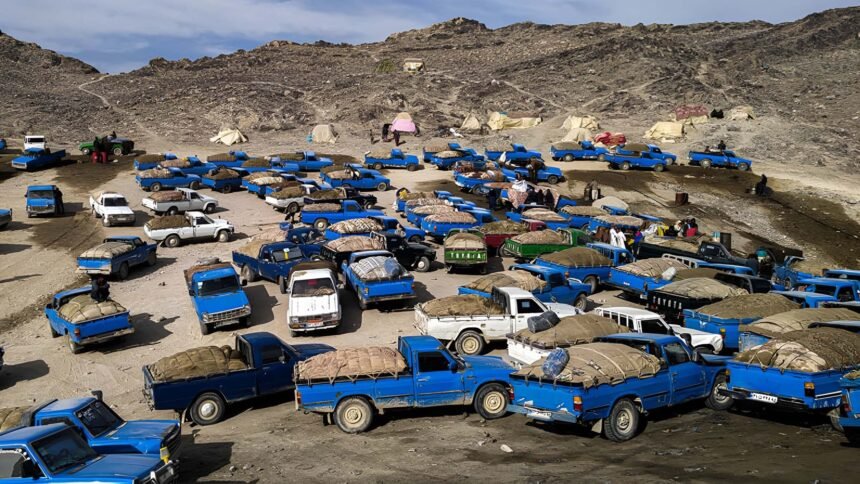The Impact of the Closure of Border: Trade and Economic Blockade on the Baloch Nation – Urdu
Before the British arrived in this region, the residents of United Balochistan enjoyed unrestricted movement and trade throughout the entire area. They led a comparatively prosperous life, considering the economic opportunities available during that time. However, this changed after the British occupation when Balochistan was divided into western, eastern, and northern regions, marking the end of Baloch centralism.
Eastern Balochistan underwent further division, with significant portions being allocated to Sindh, Punjab, and Pakhtunkhwa. In this report, we aim to shed light on the challenges the populace residing in Pakistani-occupied Balochistan faces.
In this neo-colonial system, there’s a widespread assault on the Baloch people encompassing their identity, politics, culture, education, and an escalating economic crisis. Consequently, the Baloch are enduring one of the darkest periods in their history. Today, in this age of advanced technology, the people of Balochistan are in dire need of basic sustenance.
In Balochistan’s controlled and suppressed economy, quantifying the multitude of challenges and hardships faced by the Baloch across various aspects of life proves difficult. However, the extent of oppression experienced by the Baloch people, entrenched within the colonial and Pakistani systems, is evident in their economic and social conditions. The absence of a recognizable industrial presence throughout Balochistan is striking. The largest industrial hub in the city of Hub within the Lasbela district hosts numerous factories. Unfortunately, instead of offering employment opportunities to the local Baloch populace, positions—from high-ranking roles to labor positions—are predominantly occupied by individuals brought in from cities like Karachi. The Baloch people are often deemed ineligible for employment, citing various excuses.
The Social Welfare Department of the Baloch National Movement has compiled a report aimed at comprehending the economic state of the Baloch nation. It’s widely recognized that a nation’s prosperity, peace, and overall development hinge on its economic stability. This report is intended to raise awareness among the region’s residents and the global community, particularly those who advocate for humanitarian causes, peace, and welfare states. It sheds light on the impoverished conditions endured by the people of Balochistan due to Pakistan’s occupation. The goal is to prompt understanding among the Baloch people about the challenges they face and encourage others to play a humanitarian role by advocating for the Baloch nation.
Trade Corridors of Balochistan
Balochistan spans a vast geographical area, sharing borders with Sindh, Punjab, Iran, and Afghanistan. The focus of the report under review specifically revolves around the trade corridors situated along the western border.
- Taftan
Located in the Chagai District, Taftan shares a border with Mirjavah in West Balochistan. The livelihoods of the people in this region rely heavily on cross-border trade.
- Mashkail
The Mashkail border serves as a connection between the Washuk district and the Sarawan region in western Balochistan, Mashkail is a desert region.
- Abdoi
The Abdoi border serves as a link between the Kech district and Hung in western Balochistan.
- Mand-Pishin
The Pishin border connects the Kech district with Pishan and Sarbaz in western Balochistan.
- Reemdan Border
Connects Gwadar to Chabahar by land.
- Kohak
A recognized trade corridor connects Panjgur with Sarawan.
- Paroom
It connects the rural areas of Panjgur and Sarawan.
- Pasabandan
Pasabandan is a natural harbor located west of Jamri. Iran aims to create a legal border trade center named ‘Bazarcha’ here to facilitate cost-effective and prompt border trade between the two Balochistan. Due to Pakistan’s lack of interest, the project has remained stagnant for several years.
- Gwatr
Gwatr, situated as a historic natural port, once played a significant role in hosting large commercial ships. In the past, it housed an Iranian customs office and was a vibrant hub of trade. However, over time, this once bustling natural harbor has declined to a small and uninhabited fishing port. Nonetheless, it remains of crucial importance to Iran’s security interests towards the east. Adjacent to Gwatr lies the Pasabandan, renowned for its flourishing fishing harbor. In its heyday, the fishing industry thrived, with numerous large fishing launches and a multitude of small boats anchoring in the area.
10.Kullani/Kuntani Hoor
The primary hub for trading Iranian oil and other commodities by sea is Kullani, a village in western Balochistan. Thousands of speedboats ferry Iranian oil daily from Kullani to eastern Balochistan, where they unload the oil at various depots in Kuntani Hoor. Both Kullani and Kuntani are pivotal centers for the purchase and sale of Iranian oil.
Below are the difficulties faced by those involved in this trade.
- Extortion:
One of the major challenges faced by those engaged in border trade is the extortion carried out by the state and its organized groups, depriving a significant portion of the business’s profits from the people.
- Token System:
The Pakistani army has imposed vehicle movement regulations through a token system under the guise of security concerns. However, this system has turned into a form of extortion. Despite initial assurances from the administration of no charges, individuals are being charged between 25,000 to 40,000 for a single token. These tokens are also utilized as bribes to individuals not involved in the trade, who then extort fees from others. Part of these extortion fees is given back to Pakistan Army officers either in cash or through facilitating their activities.
- Poor Roads:
The condition of rough roads poses a significant hazard for those involved in cross-border trade via vehicles, often leading to accidents, especially during adverse weather conditions, causing loss of lives.
- Firing of forces:
Incidents of firing by Pakistani and Iranian forces targeting cross-border trading vehicles are distressingly common, resulting in the deaths of several individuals every month.
- Unpredictable Border Closures:
Although there are no official restrictions on this trade imposed by the Pakistani army and the state, intermittent and unannounced shutdowns disrupt this business. These abrupt halts significantly impact the livelihoods of those engaged in this trade, leading to hunger and widespread unemployment, with no viable alternative employment options.
This report from the Baloch National Movement underscores a critical issue—the complete economic paralysis of Balochistan, subject to the whims of the Pakistani army, mafia, and an unstable business environment. A sudden halt imposed by the Pakistani army could devastate the Baloch nation by triggering a self-inflicted famine and economic collapse.


